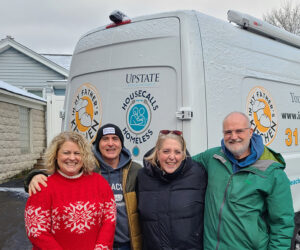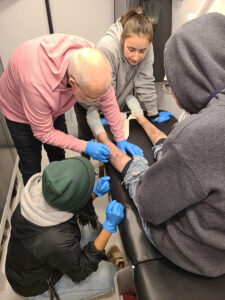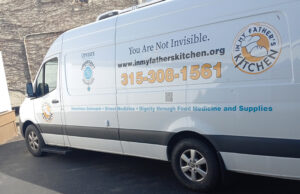My Father’s Kitchen
A chef and a doctor join forces to help the homeless
By Tim Bennett

“The measure of a society is how it treats its weakest members,” is a quote attributed to a number of people including Thomas Jefferson and Mahatma Ghandi.
Local residents of Central New York, Chef John Tumino and physician David Lehmann enrich the community’s reputation by doing something very few people do — reach out to the homeless in Syracuse full-time with their gifts and talents.
Yet, both of them came to this decision in different ways.
In 2011, Tumino had been working as a chef in his family-owned Italian restaurant, Asti, on the north side of Syracuse, with his parents and brothers for nine years. Although the restaurant was doing well, he sensed an inner prompting telling him to use his culinary skills as an outreach to the needy, full-time. As a Christian for many years, Tumino knew it was important to take those leads seriously. Initially, he thought, he was headed with his family to Costa Rico, a country he had visited several times. When the Costa Rico plan got a red light, however, he felt confused and frustrated.
It wasn’t long, however, before things became crystal clear.
Tumino explained: “I got off an exit in downtown Syracuse one day and next to the off ramp was a man carrying a cardboard sign. Nobody was giving him eye contact. So I parked my car and walked over to him, introduced myself to him and said, ‘I have a lunch here if you’d like it.’ He said, ‘Yes, I’m starving.’ So I handed it to him and said, ‘You’re not invisible. I see you and God sees you and He wanted me to give this to you.’ He took the food and said, ‘I feel like nobody sees me,’ and he began to unpack his whole life to me in 20 minutes. After that encounter, I knew this is what I was supposed to do.”
Subsequently, Tumino formed a nonprofit organization with his wife, Leigh-Ann, called In My Father’s Kitchen.

“Our goal is to find these individuals who were broken and thought they were invisible, feed them, clothe them and help them get out of that situation,” Tumino said. “IMFK’s team mission statement is: ‘consistency over time showing them dignity and value.”
Tumino believes part of that dignity involves giving homeless people quality food, which he likes to prepare himself as a former chef, like lasagna and chicken wraps.
In 2018, Lehmann, a teacher at Upstate Medical University since 1994 and a general internist and doctor of pharmacy, had been working in the ER and seeing patients in the hospital — in addition to teaching medical students — when he, like Tumino, felt compelled to help the homeless.
Lehmann described it this way: “I was working at the hospital taking care of patients and I would see a revolving door of folks coming in suffering from abscesses, blood pressure issues and strokes — things that could have been prevented if intervention was placed earlier, but they didn’t have a doctor. All of these guys coming through, most of them had health insurance through Medicaid. They just didn’t have a doctor to prescribe them medicine. So I got frustrated and a saying from Saint Augustine came to me about hope having two beautiful daughters, the first one being anger at the way things are and the second being the courage to change things. I decided to go ahead and forget that part of my salary that comes from critical care and transform my patients to people on the street and in the shelters.”
In February of 2018, Lehmann co-founded HouseCalls for the Homeless with Mia Ruiz-Salvador, who is the program coordinator.
Tumino explained how he met the doctor and what transpired.
“Six years ago doc and I were at the same meetings and he had a desire to come out to the streets. We had a mechanism in place to reach the group of people he wanted to reach and it was like a no-brainer to get him on the van. I said, ‘C’mon out’ and he came with his little black bag and never left,” he said.

Both Lehmann and Tumino hit the streets on Tuesdays and Thursdays in their new 2022 Mercedes van, which was given to them by the city of Syracuse in 2023 from leftover federal funds allotted during the COVID-19 pandemic, with the names of both organizations emblazoned on the sides and rear panel. As a tenured faculty member of the SUNY system, Lehmann said he always makes sure there are medical students with him when they go out.
“I like to have the first- and second-year medical students. I like to get them young and get them exposed to compassionate care and meeting people where they’re at,” he said.
Lehmann said that 95% of the homeless people they meet have addiction problems or mental health issues like anxiety, depression and schizophrenia. For the addicts, Lehmann gives them suboxone, which treats cravings and stops withdrawal symptoms. He also treats skin conditions because often addicts use dirty syringes, which invite infections. For those with mental health problems, he said, he can usually get them the meds they need if they have been diagnosed by a doctor.
When asked why homeless people don’t go to places like the Rescue Mission and Salvation Army shelters, Tumino said, “One of the things that we’ve learned over the last 12 years is, first of all, there are rules in these places and if you have addictive problems, or if you are dealing with anxiety or depression, you try to avoid those situations. Also, if you are someone who uses drugs actively you might know someone at the shelter who also uses drugs, with whom you may have a problem and you don’t want to be bullied or beaten up, so you feel unsafe to go there. If you are a woman, you feel especially vulnerable in that environment because it is male – dominated.”
Since 2011, In My Father’s Kitchen has blossomed and now implements new programs and employs 15 people. A new program called ‘Hire Ground’ gives nine homeless people, Monday through Thursday, an opportunity to work doing menial jobs around the city such as picking up litter, cleaning up at the fairgrounds or raking leaves, instead of panhandling.
“As long as they do not make scenes, even in the middle of their addictions, they can participate,” Tumino said.
Three IMFK employees supervise this program. For their efforts the homeless workers receive breakfast and lunch as well as $50. Another new program is Life Home, which is a place where women who have been trafficked can come for healing and counseling over a 16-month period to help them transition back to society.
Another critical service IMFK provides in conjunction with HouseCalls for the Homeless is transportation to medical appointments and connecting them to other city agencies, which are part of the Housing and Homeless Coalition of Central New York. When a homeless person does find lodging, IMFK is committed to stay in touch with them for six months providing emotional support, household items and filling their fridge when they first move in.
Since its inception, IMFK have helped 343 people get off the streets.
Lehmann said one of the most dramatic turnarounds he has witnessed on the streets was with a young man in his 30s who was using alcohol due to a bad anxiety disorder. The man also had recurrent staph infections with boils.
Unfortunately, Lehmann said, this person was stigmatized by the medical system because to them, as someone with staph infections and being homeless, he was a heroin addict.
“But that wasn’t him,” Lehmann said. “He comes into our van and asks me, ‘What do you do?’ I said, ‘I provide medical care.’ He said, ‘But I stink and I’m bad.’ We got him cleaned up, lanced his boils and I gave him antibiotics. After the treatment he broke down in my arms and said, ‘You see me.’ We got him on meds for his anxiety and now he’s housed and employed.”
In terms of where the homeless of Syracuse come from, Tumino said that 95% of them were born and raised in Onondaga County. Tumino said he feels a daily urgency to reach the homeless in the community.
“Since we started, 74 homeless people have died. Three were hit by vehicles, two were murdered living in homelessness and the majority overdosed. Three guys died in an abandoned house fire trying to stay warm,” he said. “The statistics show that the average amount of time people survive living on the streets is only 2.7 years.”
Tumino and Lehman currently visit 35 homeless people regularly. Last summer, Tumino said, there was a big uptick and the number of people living on the streets ballooned to 75 people.
In preparation for another busy summer and for annual weekly supplies and expenses, My Father’s Kitchen and HouseCalls for the Homeless will have a fundraiser April 11 at The Palace Theater at 5:30 p.m. Mayor Ben Walsh will be speaking.
For more information on the two organizations, go to https://inmyfatherskitchen.org/ and https://www.upstatefoundation.org/HouseCalls

